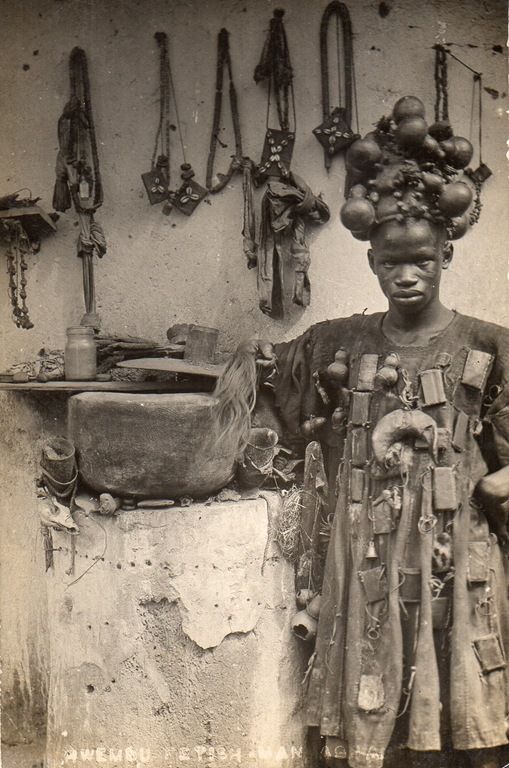Magic and witchcraft in traditional black Africa (notes)
(Extract from the article Traditional African Religions: some general keys. from De Dioses y Hombres blog. I invite you to pay a visit to it and read the full article here:
https://confurfeo.blogspot.com/2017/04/las-religiones-tradicionales-africanas.html )
(...) it only rest to speak about traditional African esoterism. African distinguish between magic and witchcraft, being the first one positive and social, the second one hostile and with evil objectives. They are incompatible however they share many of their techniques with very different objectives. The wizard acts in public however the sorcerer makes hidden magic. While a wizard is a complete being, the sorcerer is not since in his origin shows the unbalance he will bring. The wizard often is the one who identifies if there is some sorcerer meddling the good way of a tribe. He appoints him with a powerful amulet, usually an animal's tail.
Among the African traditional religion only the magic can enter. Their main laws are similar to other culture's. The similar affects the similar, black attracts black clouds. Building or destroying affects the purpose. Not everything is easy and also technique and attitude influence the good performance of magical acts. Here we find again the psychodrama model. Many would define this magic as we call medicine, herbology or psychology but when the practice application to an illness that can be caused by divine forces, must eliminate the religious-centered view. Many chose to call the African magic esoterism, the hidden, to avoid thinking in the western view.
Some acts related with magic are possessions, before mentioned. A genie or an ancestor can talk through a human being, sometimes achieving temporary ecstasy, other cases, immerse the person under an illness or a trance state unable to heal. Sometimes there are good spirits or evil ones which must be expelled by an exorcism. We could divide possessions between two types: wanted or not wanted. When they are wanted, there is no suffer since human soul allows its place. When it is not wanted the spirit interrupts and the man becomes the 'mount' or 'wife' of the genie, god or ancestor that controls the human soul. However, the messages that it sends are usually clear. Divination is also continuous and not necessary carried out by a magician. Magicians have been chosen by own will or divine signs, or by their gifts. They have studied with a master the exact techniques, but anyone can have a particular gift without being specialized. Some of these fortunetellers are interpreters of people possessed. Others use geomancy, gems, tephramancy, astragalomancy, zoomancy... There are always carried out at everyone's sight since if it was not the case, a sorcerer would be the one to carry it out. All of these acts can be carried out to by the sorcerers and they are called vudu/voodoo fa or sikidy. Also all the people in a community can participate manufacturing amulets and charms in order to know their use and efficacy.
To be magician or also a sorcerer, an initiation is required as well as a master teaching. As a sign of the patriarchal system women usually fell more into witchcraft and they can pass their powers to their descendents. Sorcerers, in addition to that "genetic" spell, have the power of bilocation and metamorphosis with some limitations. Adapted to the town they are working and their believes of pure animals, or impure, more or less humans, etc. Their objectives usually are souls or divine doppelgangers from those who are cursed. They languish without no apparent reason. The sorcerer "devours" while the magician "nourish". Not only magicians can intercede against a sorcerer: if his influence is destructive, priests can carry out exorcisms and purification rituals and all the people can participate by identifying and expelling.
A shaman remains in the same status as a magician and there were many researches that fought to find similarities and differences among them to know where to place him properly. A shaman, for example, communicates with deity by own will. When he defeats the forces from evil witchcraft, he becomes more powerful since he absorbs those energies. His knowledge, in the other hand, has a public view but also mysticism and secrecy that do not side with the magician, besides his social function is undeniable. But in order to speak about shamans would require another article, is not only an example from Africa but every culture.
Pietro Viktor Carracedo Ahumada - pietrocarracedo@gmail.com
Bibliografía:
GONZÁLEZ ECHEVARRÍA, A: Invención y castigo del brujo en el África Negra. Serbal, Barcelona, 1984.
MARCO, R: El árbol y la liana. Mundo negro, Madrid, 1992
ROUMEGUERE - EBERHARDT, J: Pensamiento y sociedad africanas, Cahiers de l'home, 1963.
STAMM, A.: Les religions africaines, Presses Universitaires de France, 1995
THOMAS L.V.: La tierra africana y sus religiones. Larousse université, 1975
ZAHAN, D: Religión, espiritualidad y pensamiento africanos, Payot, 1970
Related articles:


